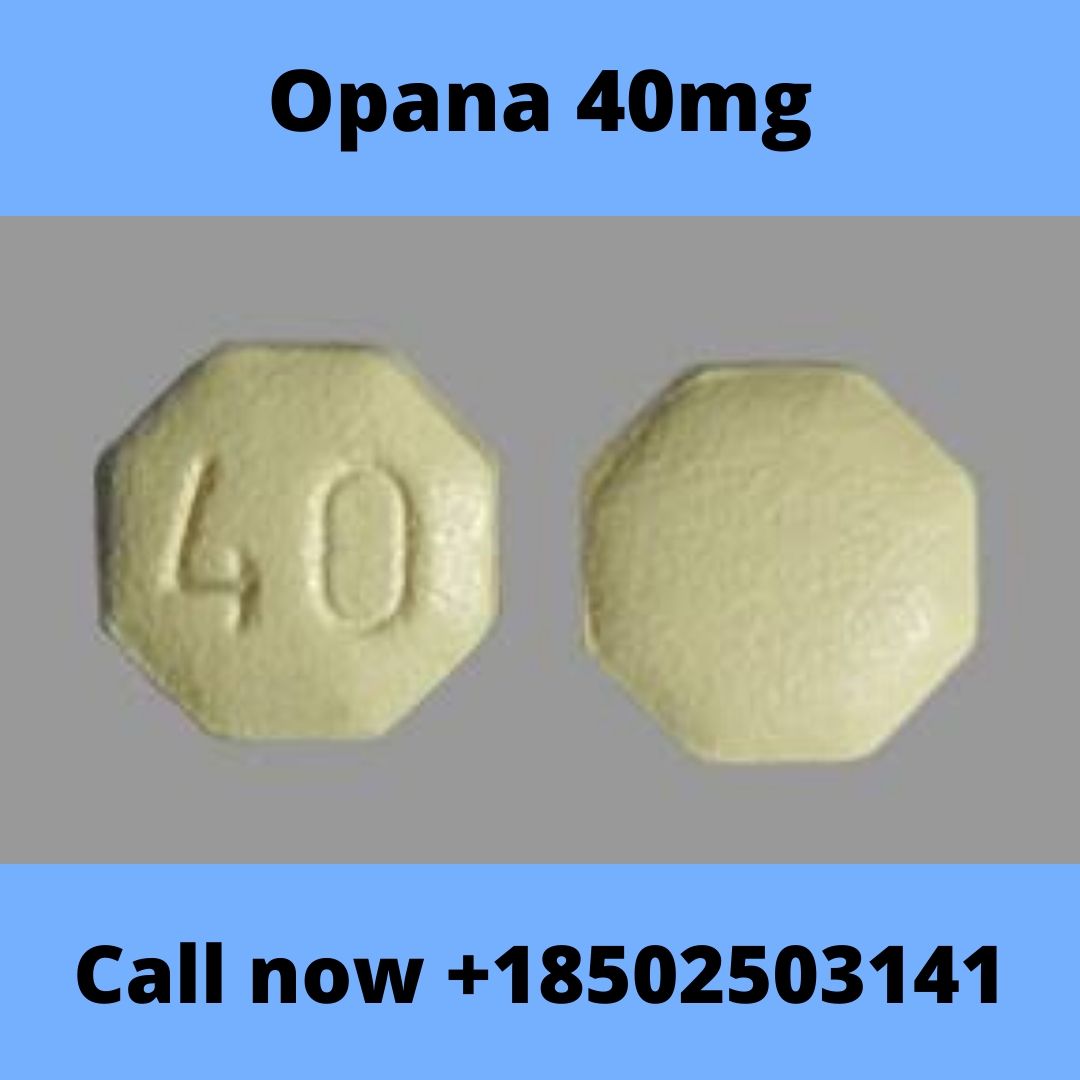| Active ingredient | Oxymorphone Hydrochloride |
|---|---|
| Drug Class | Opiate (Narcotic) analgesics; opioid agonists |
| Working | Works by changing the manner of response the brain
and nervous system provide to pain. |
| Prevents | Also works to prevent withdrawal symptoms caused by
stopping other opioids |
| Kicks In | Around an hour |
Opana
Opana is a prescription opioid drug (oxymorphone hydrochloride), which is used to treat severe long-term pain. It belongs to a drug class called as long-acting opioid analgesics. It is available as an immediate-release tablet, extended-release tablet, and extended-release injectable solution.
How does Opana work?
Opana mainly works on our brain cells (opioid receptors present in them) and modifies the way we feel and respond to the pain. This helps to lessen your tenderness of pain. Lactose monohydrate, magnesium stearate, and pregelatinized starch are the inactive ingredients in Opana.
Dosage
Immediate-Release Tablet: 5 mg, 10 mg,
Extended-Release Tablet: 5 Mg to 40 Mg
Extended-Release Injectable Solution: 1 mg/mL
Read the prescription usage guides suggested by your doctor. Do not take Opana on your own. Also, inform your doctor beforehand about any medication or any kind of supplements you are taking. Dosage can vary with one’s medical condition, receptivity to treatments, or for children based on their weight.
This medicine is taken orally, at least 1 hour before or 2 hours after having your meal. It is usually taken in a gap period of every 4 to 6 hours. Start with 10 to 20 mg every 4 to 6 hours as suggested for pain. Take one tablet at a time with plenty of water to ensure complete swallowing instantly after placing it in the mouth.
You should start with the lowest effective dosage so that the drug acclimatizes with your body. Also, do not abruptly discontinue Opana because sudden discontinuation of Opana has resulted in consequential withdrawal symptoms, uncontrolled pain, and suicidal thoughts. Withdrawal symptoms may include restlessness, mental/mood changes (including anxiety, trouble sleeping, thoughts of suicide), watering eyes, runny nose, nausea, diarrhea, sweating, muscle aches (myalgia), or abrupt changes in behavior.
Because of the possibility of addiction, abuse, and misuse with opioids, even at prescribed doses, and because of the greater chance of overdose and death with extended-release formulations, Opana is used as a second option in some cases of patients with less tolerance capability.
Side Effects
Withdrawal symptoms may include:
- restlessness
- irritability
- insomnia
- sweating
- chills
- muscle and joint pain
- nausea
- vomiting
- diarrhea
- increased blood pressure
- increased heart rate
Serious Effects:
- Pyrexia
- Somnolence
- Pruritus
- Headache
- Dizziness
- Constipation
- Confusion
- Life-Threatening Respiratory Depression
- Adrenal Insufficiency
- Severe Hypotension
- Gastrointestinal Adverse Reactions
- Seizures
- Decreased Sexual Desire
- Changes in Heartbeat
- Extreme Drowsiness
- Fainting
- Irregular menstruation
Overdose:
An incident of even 1 dose, especially by children, can result in a lethal overdose. Opana can be abused by crushing, chewing, snorting, or injecting the drug. Overdose risk is increased with regular abuse of Opana with alcohol and other central nervous system depressants. Symptoms may include respiratory depression, drowsiness progressing to stupor or coma, skeletal muscle flabbiness, cold and moist skin, constricted pupils, and, in some cases, pulmonary edema, bradycardia, hypotension, partial or complete airway obstruction, atypical snoring, and death.
Warnings
If you are allergic to any of the constituents of Opana, please inform your doctor about the same. Also, inform your doctor beforehand about any medication or any kind of supplements you are taking.
Inform your doctor about any sort of liver disease or blocking in your stomach or intestine. Let your doctor know if you have or ever had seizures; problems regarding urinating, or kidney, pancreas, thyroid, or gall bladder disease.
This drug is reported with decreasing fertility in both men and women. Talk to your doctor about the risks and consequences.
If you miss even a single dose, take it as early as you recall.
Avoid any kind of misuse, abuse, and overdose of this drug. It can lead to death. Be sure not to crush or inhale the drug, or it can cause immediate release leading to death. Fatal respiratory disorders have been also reported in some people across the globe.
Use of Opana during pregnancy is not generally prescribed as it can lead to morphological disorientations in the developing fetus and also severe levels of withdrawal symptoms to the mother. Symptoms can be abnormal sleep patterns, vomiting, diarrhea, irritability, and failing to gain weight.
Consuming alcohol during the treatment is strictly not prescribed as it may cause dizziness and respiratory depression which in rare cases can lead to death.
People should use caution if they are suffering from Addison disease, prostatic hyperplasia, central nervous system (CNS) depression, emotional lability, head injury, hypothyroidism or untreated myxedema, intracranial hypertension, brain tumor, toxic psychosis, urethral stricture, urinary tract surgery, seizures, kyphoscoliosis, severe obesity, etc.
Frequent seizures may occur in some patients already suffering from some sort of seizure disorder. Opana can have some sort of effect on the ability to drive and work on machines. So, dizziness is noticed occasionally in people working with any kind of machine. Inform your doctor if you face any kind of discomfort.
Discontinuing the drug abruptly may lead to some withdrawal symptoms and the comeback of severe pain.
Interactions
Severe interactions may happen with the following drugs:
- artemether/lumefantrine
- benzhydrocodone/acetaminophen
- bremelanotide
- buprenorphine
- cimetidine
- fentanyl
- fentanyl intranasal
- fluoxetine
- hydrocodone
Regular use of alcohol can increase oxymorphone levels in the blood and it can be fatal. So, it is instructed not to consume alcoholic beverages during the treatment.
The use of Opana with other opioid drugs can affect the neurotransmitters present in the brain and can cause serotonin syndrome.
Storage and Precautions
- Store it at below room temperature.
- Keep it away from excess heat and moisture.
- Store out of sight and reach of children.
- When medicines are no longer in use, they should be disposed off on time.
- If the pack has expired, do not consume the pills.
Frequently Asked Questions (FAQs)
Why is this medication prescribed?
Opana is a prescription opioid drug (oxymorphone hydrochloride), which is used to treat severe long-term pain. This helps to lessen your tenderness of pain.
What are the side effects of Opana?
Common side effects may include dry mouth, stomach pain or swelling, nausea, vomiting, gas, and excessive sweating.
What special precautions should I follow?
If you are allergic to any of the constituents of Opana, please inform your doctor about the same. Also, inform your doctor beforehand about any medication or any kind of supplements you are taking.
What happens if I overdose?
It can be fatal, especially in a child or other person using the drug without being prescribed for the drug.
How should I use oxymorphone?
Take it orally, at least 1 hour before or 2 hours after having food. It is usually taken in a gap period of every 4 to 6 hours. Start with 10 to 20 mg every 4 to 6 hours as suggested for pain.


Reviews
There are no reviews yet.